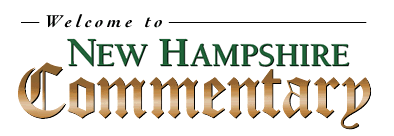

The Mayflower, and a Little Pilgrim History
![]() How the Pilgrims 'Got America Started' -- George
F. Will
How the Pilgrims 'Got America Started' -- George
F. Will
Tribute to U.S. Ambassador Robert C. Hill, late member, New Hampshire Mayflower Society -- Dean Dexter
______________________________________________________
New Hampshire and the Observance of Thanksgiving
The first Thanksgiving was celebrated in 1621 when Governor William Bradford proclaimed a three-day feast after a successful harvest, following the devastating winter where over half their members died. But do you know the role New Hampshire has played in this most American of holidays?
As early as 1781, the Continental Congress in Philadelphia proclaimed November 28 “as a day of solemn thanksgiving to God for all his mercies,” and sent copies of the document to each colony (see below). New Hampshire’s first Governor, Meshech Weare (the official title then was “President”), ordered the proclamation “forthwith printed,” and delivered far and wide “to the several worshipping assemblies in this state, to whom it is recommended religiously to observe said day, and to abstain from all servile labor thereon.” So much for the mythology of a “separation of church and state” mindset among the nation’s founders.

New Hampshire's Sara Josepha Hale
In fact, days of “thanksgiving, fasting, and prayer” were common in the founding era, and a holiday commemorating the Pilgrim’s sacrifices after harvest was popular throughout the 13 colonies, although not observed on a common date. George Washington was the first president to declare a national Thanksgiving Day under the new Constitution in 1789.
Thanksgiving remained popular throughout the country during the 1800s, but it was the 35 year crusade of a New Hampshire woman, Sara Josepha Hale of Newport (above), author of the anti-slavery best-seller, Northwood, and a powerful editor of a national magazine, that persuaded President Abraham Lincoln, who Sara had personally lobbied, to declare the last Thursday in November a national holiday in 1863.
In an effort to extend the Christmas shopping season following the Great Depression, President Franklin Roosevelt, a Mayflower descendant, changed the observance to the third Thursday in November. After much controversy, however, Congress permanently changed the date back to the fourth Thursday in 1941.
— Dean Dexter
From the Fall 2008 Shallop, a publication of the Society of Mayflower Descendants in the State of New Hampshire

__________________________________________________________________________


The Mayflower caught in a riptide off the coast of what is now Long Island, N.Y., November 9, 1620 is nearly shipwrecked. Original art by Mike Haywood provided by the General Society of Mayflower Descendants.
Writes Haywood:
"Here is the final picture of my Mayflower series. On November 9, 1620, the Mayflower's crew sighted Cape Cod and attempted to sail south to the mouth of the Hudson River, near modern-day Long Island, New York. Although the weather was fine, they got caught in a riptide and nearly shipwrecked on the shallow sand banks to the south of the Cape at Monomy Point. Pilgrim William Bradford described the event as follows:
" 'After some deliberation had amongst them selves and with the master of the ship, they tacked aboute and and resolved to stande for the southward (the wind and weather being faire) to finde some place aboute Hudson's River for their habitation. But after they had sailed that course aboute halfe the day, they fell amongst deangerous shoulds and roring breakers, and they were so farrr intangled ther with as they conceived them selves in great danger; and the wind shrinking upon them withall, they resolved to bear up againe for the Cape, and thought themselves hapy to gett out of those dangers before night overtooke them, as by God's providence they did.' "
_______________________________________
Genuine recipe for Thanksgiving Cookies (Joe Froggers).
Recipe for Turkey the way the Pilgrims would have cooked it!

Below are selected Programs from past meetings of the New Hampshire Mayflower Society





Society of Mayflower Descendants
in the State of New Hampshire
Officers 2008-2011
___________________________________
Dean Dexter, Governor
John Payzant, Deputy Governor
Heather Rojo, Recording Secretary
Jo-Anne M. Cobban, Corresponding secretary
Robert F. Small, Treasurer
Deborah E. Moore, Historian
Harry D. Hadaway, Elder
Susan Masison, Surgeon
Peter B. Lighthall, Esq. Counselor
Heather D. Rojo, Captain
Gail Hancock-Huttel, assistant (2013)
Carol Gagnon, Assistant (2013)
Ruth Kelsea, Assistant (2011)
Anne Vadakin, Assistant (2011)
_______________________
Living Past Governors
Walworth Johnson, Jr., 2005-2008
Carlton Bradford, 2003-2005
Joanne Tuxbury, 2000-2002
Stephen M. Sweet, 1996-1999
Shirley E. Thivierge, 1993-1996
Edward Fuller Holden, 1990-1993

Former New Hampshire Mayflower Society governors Walworth Johnson, Jr., left, and Carlton Bradford with incoming Governor Dean Dexter, November 8, 2008 annual meeting, Concord, N.H.
____________________________________________________________
Dr. John Robinson of Meredith Addresses NH Mayflower Society Luncheon, Nov. 3, 2007
New Hampshire Historical Society President John Robinson was the guest speaker at the Fall 2007 Compact Day luncheon, held at the Concord Holiday Inn on November 3. Robinson used the example of his own ancestor, a Revolutionary soldier also named John Robinson, to convey a picture of life in central New Hampshire, and of the social and cultural forces at work in the region preceding, during, and after the War for Independence. Robinson, a retired Dean of Graduate Studies at Boston’s Simmons College, now lives at the family homestead in Meredith, founded by his Revolutionary forebear, which has been in the family, uninterrupted since the 1790s.

Robinson suggested life in New Hampshire at the time of the Revolution had taken on a kind of “garrison mentality,” due to the many conflicts with Indians people were exposed to as they settled in the wilderness, including the larger struggles of the era, such as the bloody King Philip’s War, following the death of Massasoit, and the various Colonial Wars: King William's, Queen Anne's, and King George's, and the French and Indian War. While the Indians were one menace, certainly the British were another. Antagonism with British rule under New Hampshire’s Royal Governors also encouraged the sense of a martial self-sufficiency among the citizenry.
Thus, well accustomed to ongoing warfare of one kind or another for nearly 200 years, Robinson’s ancestor was likely not aware – along with everyone else – of the high significance of the cause he was joining when he enlisted as a drummer boy in Washington’s army under General John Sullivan at Exeter in June of 1775, which was, of course a full year before the Declaration of Independence. Then, no one really knew what was at stake except that the British army was occupying Boston, and this was ominous. The ancestral Robinson was sixteen, and to him, this was probably just another call to meet a common threat, something young men of his age had been doing for generations.
But of course, this was not just another conflict. In the end, the boy grew to manhood under arms, and was taken prisoner by the British twice during his more than six years of service, which included that famous winter at Valley Forge with Washington. Young Robinson also fought in the battles of Quebec, Hubbardton (Vermont), Monmouth (New Jersey), and Yorktown (Virginia). He was captured both at Quebec and Hubbardton, and in one case escaped, and in another, paroled.
After the war, young Robinson, a descendant of Mayflower passenger, Degory Priest, returned to Meredith to resume the difficult life of a farmer on the edge of what was still wilderness. He died in March of 1848, just shy of his 89th birthday, a military pensioner, a fact proudly noted on his headstone in a small graveyard on the Meredith homestead.
Robinson sees irony in the post-Revolutionary life for his ancestor, and his neighbors. Since his life differed little from that of his Colonial forebears, this “Revolution” for which he fought so long in the end had little practical effect on Robinson’s personal life or fortune. As was the case for his Pilgrim ancestor, it would be left to future generations to assess and fully appreciate the role this soldier of the Revolution, and others like him, played in what turned out to be a truly great moment of history.
Dr. Robinson, whose father was a member of the Massachusetts Society, received his undergraduate degree in American Civilization from Brown University, and his Ph.D. in Education from Harvard. His wife Olga joined him as a guest of the Society at the luncheon. They celebrated their 50th wedding anniversary in June, 2007.
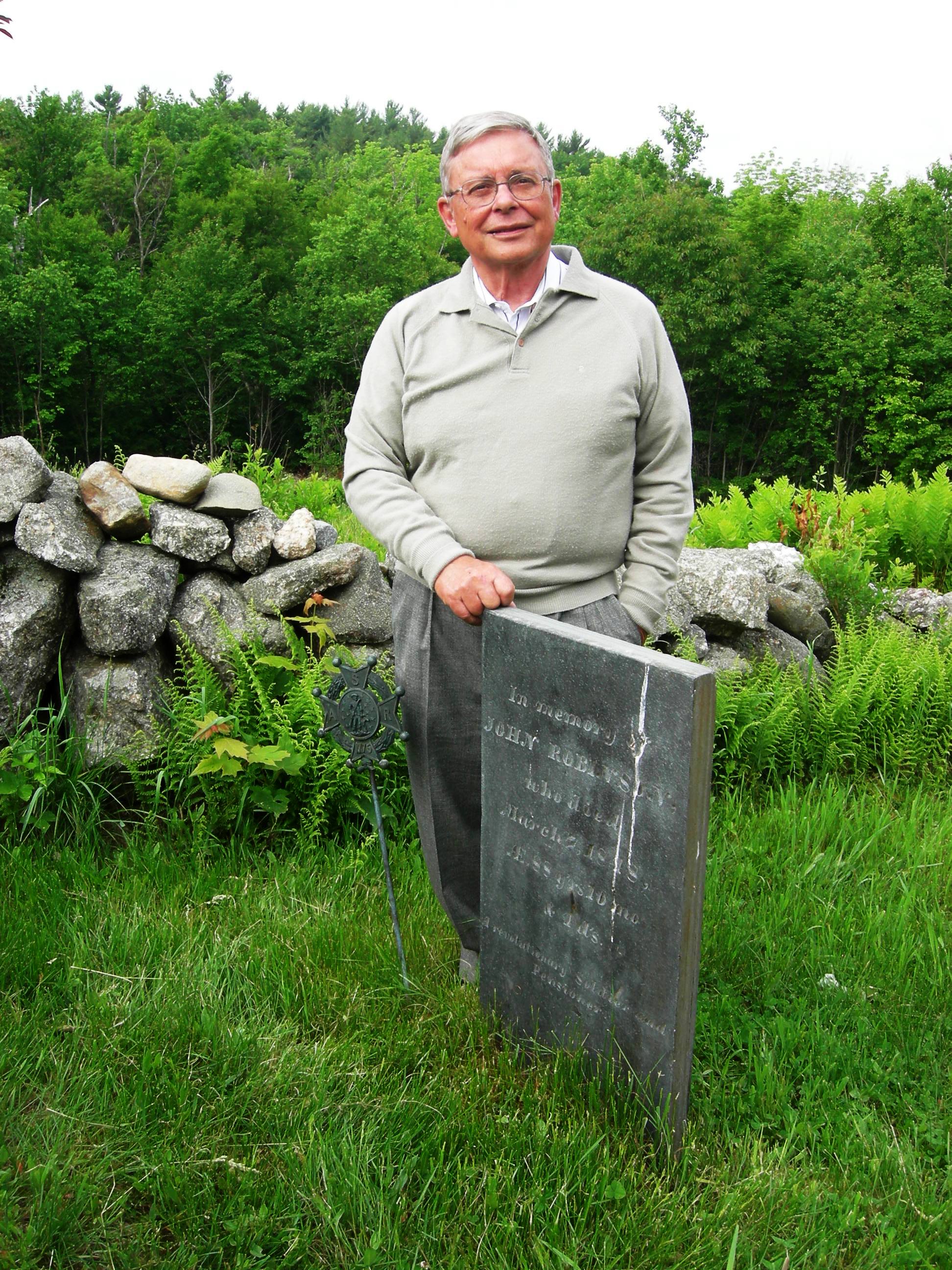
Dr. John Robinson at the grave of his ancestor, Revolutionary War soldier John Robinson, a descendant of Mayflower passenger Degory Priest, on the family farm, Chemung Road, Meredith, New Hampshire.
Peter Wallner, Franklin Pierce Biographer, Addresses Society at May 19, 2007 Luncheon at Concord Holiday Inn
 Dr. Peter
Wallner
Dr. Peter
Wallner
By signing the Kansas-Nebraska Act of 1854, Franklin Pierce, New Hampshire’s only president, probably averted an immediate civil war, buying the nation a much needed six years to prepare for a conflict that was inevitable. This according to Pierce biographer Dr. Peter Wallner, who addressed the society at its spring luncheon on May 19th at the Holiday Inn at Concord.
Admitting that Pierce is often rated as one of the nation’s worst presidents, mostly because of his decision to support the act, which ended the Compromise of 1820, prohibiting slavery in the northern states (above the latitude 36°30' north), Wallner believes Pierce had little choice. Wallner explained the Kansas-Nebraska Act allowed the settlers of the territory to decide whether or not to accept slavery into the new states. Given the stakes, Pierce’s decision was reasonable, “though not a happy one,” the author said.
By initially supporting, then signing the Act, Pierce alienated northern Democrats, and doomed his political future, and his place in history. It was a decision, however, that Pierce never regretted making, Wallner said.
“We should look at what would have happened if Pierce had not supported the act,” the author suggested.
Wallner noted the Act was authored by Stephen A. Douglas, the powerful Illinois Democrat, in an effort to open the west to expansion, and make a way for the eventual construction of the transcontinental railway, linking the eastern states to California, which had already attained statehood.
Without the plan, the southern states would have never allowed the new territories into the union as non-slave states, thus halting the western expansion, which had already gained popularity.
If Pierce had opposed the law, Wallner stated, the Democrats, the only true national party at the time, would have fractured, and the southern states would have immediately seceded, an action many had been threatening since 1850, if not before.
Wallner said presidents like Pierce are in a different category than ones like Lincoln and Franklin Roosevelt, who had great events thrust upon them, and by addressing them successfully, attained greatness. Pierce had no such crisis at which to react, but rather had to make tough decisions as they came his way.
The author of a two volume biography on the 14th president, Wallner’s second book, Franklin Pierce, Martyr for the Union, which focuses on the White House years and after, had not yet been released.
Following his remarks, however, Wallner visited with members and signed copies of his first volume (Franklin Pierce, New Hampshire’s Native Son, published in 2005), which chronicled the president’s birth to his election to the White House, and were also available for purchase.
Currently the director of the New Hampshire Historical Society Library, Dr. Wallner moved to New Hampshire expressly to do research on Pierce, and to write the biography, which is only the second serious study of the 14th president. — Dean Dexter.
Access a review of Volume 1: Franklin Pierce,
New Hampshire’s Native Son
![]() LINK
LINK
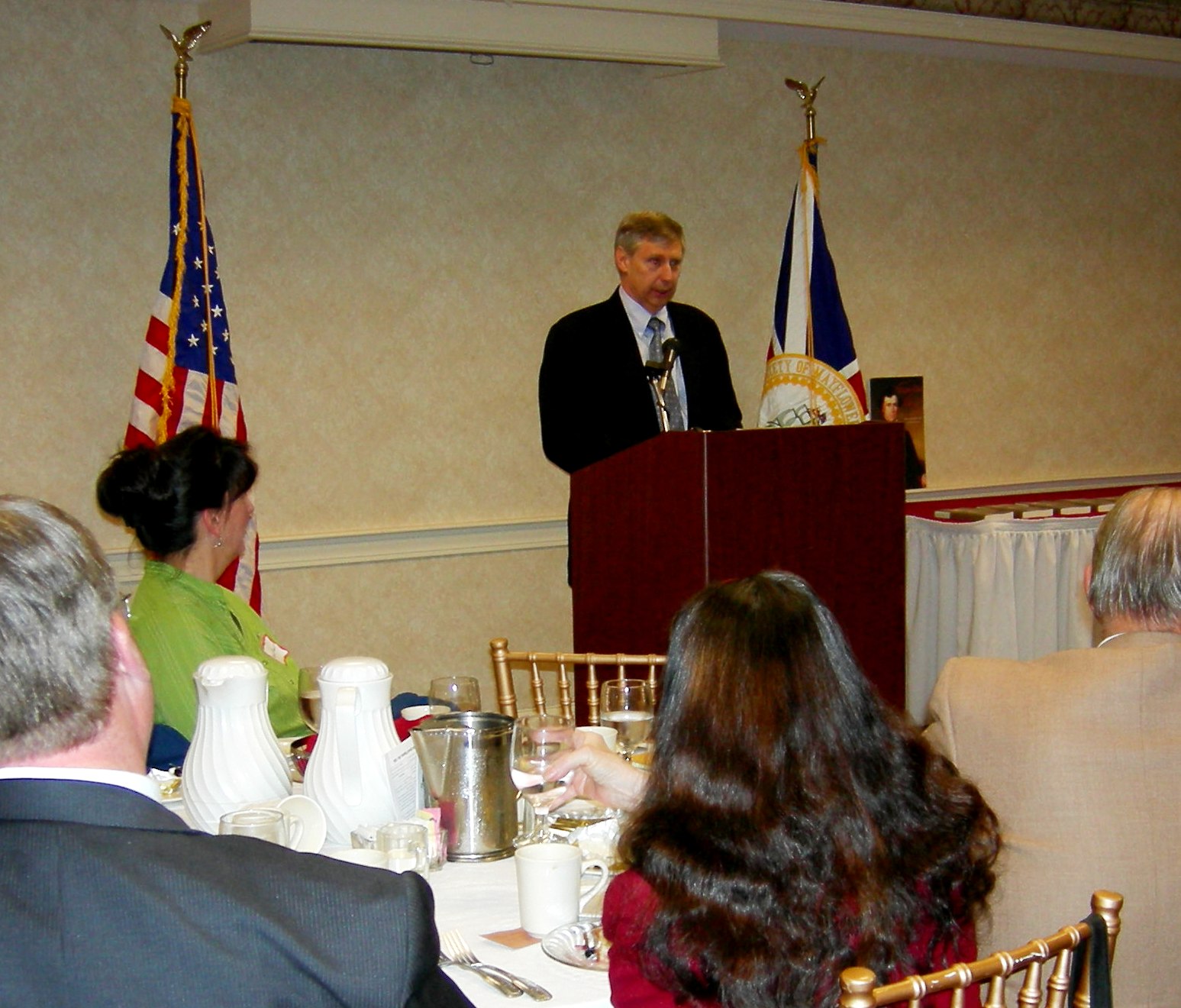 Dr. Wallner is currently director of the New Hampshire Historical Society
Library.
Dr. Wallner is currently director of the New Hampshire Historical Society
Library.
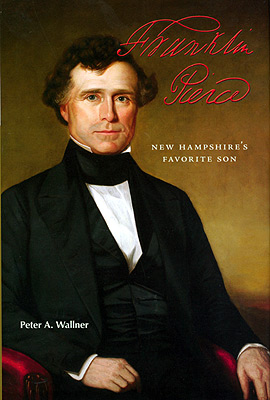 Volume 1
Order the book here:
Link
Volume 1
Order the book here:
Link
 Volume 2 Order the book here:
Link
Volume 2 Order the book here:
Link
New Hampshire Mayflower Society Celebrates 75th Anniversary, November 2005

Among those attending the 75th Anniversary dinner of the Society of Mayflower Descendants in the State of New Hampshire at Concord on November 5, 2005 were: Dean Dexter, deputy governor, former society Governors Edward F. Holden and Joanne Tuxbury, outgoing Governor Carlton R. Bradford and Mrs. Bradford, former Governor, the Rev. Paul Sweet, outgoing Deputy Governor General and Governor of the Illinois Society Don West, the guest speaker, and long-time Board of Assistants member Margaret "Peg" Moreland.

Incoming N.H. Society Governor Walworth Johnson, Jr. addresses the 75th Anniversary meeting as outgoing Governor Carlton Bradford looks on.

Historic 2003 Gathering: Massasoit and Governor Bradford Kin Pow-wow in Concord, New Hampshire at Mayflower Society Meeting.
Nearly 400 years after a peace treaty was signed by their ancestors, direct
descendents of Pilgrim Governor William Bradford and Chief Massasoit, met
in Concord to celebrate the rich place both families have in American history,
as well as the special relationship native Americans had with the first white
settlers in New England.
Paul A. Weeden of Bristol, Rhode Island, also known as Deerfoot, was the
guest speaker before the N.H. Mayflower Society on May 17th (2003), hosted by society
governor Carlton Bradford of New London. The event was open to the
public.
Weeden, who traces his lineage to Massasoit through his father, lived with his
cousin, the renowned Princess Redwing, for a period as a child while attending
school in Charlestown, Rhode Island. Princess Redwing was selected on behalf of
her peers to be the first native American to address the United Nations in 1946.
Before her death in 1987 she called her people together to pass the mantle of
her authority as orator and protector of the Royal House of Pokanoket and the
Pokanoket Tribe of the Wampanoag to her nephew Deerfoot (Weeden).
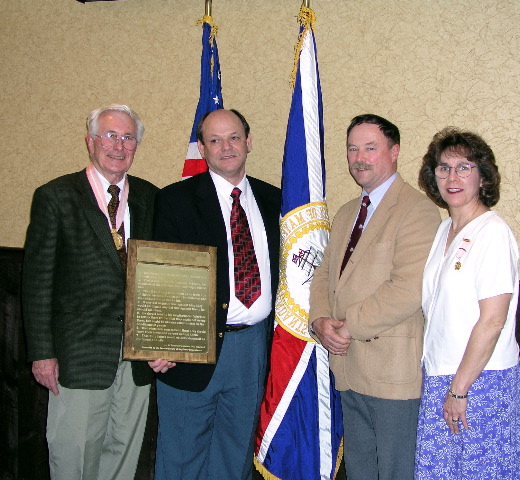 Paul A. Weeden, second from left, orator and council president of the
Pokanoket tribe was guest speaker at the Spring 2003 meeting of the N.H. Society
of Mayflower Descendants at Concord on May 17th. With Weeden, also known as
Deerfoot, is Society Governor Carlton Bradford, Deputy Governor Walworth
Johnson, and Immediate Past Governor Joanne Tuxbury.
Paul A. Weeden, second from left, orator and council president of the
Pokanoket tribe was guest speaker at the Spring 2003 meeting of the N.H. Society
of Mayflower Descendants at Concord on May 17th. With Weeden, also known as
Deerfoot, is Society Governor Carlton Bradford, Deputy Governor Walworth
Johnson, and Immediate Past Governor Joanne Tuxbury.
Since that ceremony in 1987 Deerfoot has traveled widely as orator for his
people, speaking at schools and service organizations throughout the nation,
carrying on a documented tradition that has spanned generations.
In an interesting twist, Deerfoot is also directly descended from Mayflower
passenger William White, through his mother.
Mayflower Society Governor Carlton Bradford notes the treaty between Massasoit
and his ancestor, William Bradford, signed in 1621, lasted 50 years and is
testimony to the respect the two peoples maintained during the birth of the
European settlement. Relations between the two peoples began to erode only as
the first generation died out and as the Puritan Massachusetts Bay Colony came
to dominate the region.
Bradford says Deerfoot offered a unique perspective on the relations of the two
peoples. The Luncheon was held at The Red Blazer, Manchester Street, Concord.
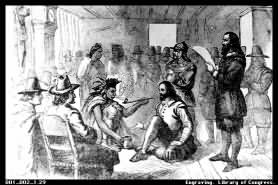 Chief
Massasoit and Gov. William Bradford sign a treaty that lasted 50 years.
See Link here.
Chief
Massasoit and Gov. William Bradford sign a treaty that lasted 50 years.
See Link here.
N.H. Society Seal on the commemorative plaque in the N.H. State House, first floor back hallway.
The Mayflower at sea, original art by Mike Haywood provided by the General Society of Mayflower Descendants.
Mayflower Society Websites
List as of Posting, January 21, 2006

Photograph of a painting by Edward Percy Moran (1862-1935), showing Myles Standish, William Bradford, William Brewster and John Carver signing the Mayflower Compact in a cabin aboard the Mayflower while other Pilgrims look on.” ca.1900. The original hangs at the Pilgrim Hall Museum in Plymouth, MA.
Ye Mayflower Compact
In ye name of God, Amen. We whose names are underwritten, the loyall subjects of our dread soveraigne Lord King James, by ye grace of God, of Great Britaine, Franc, & Ireland king, defender of ye faith, &c.
Haveing undertaken, for ye glorie of God, and advancemente of ye Christian faith, and honour of our king & countrie, a voyage to plant ye first colonie in ye Northerne parts of Virginia, doe by these presents solemnly and mutualy in ye presence of God, and one of another, covenant & combine our selves togeather into a civill body politick, for our better ordering & preservation & furtherance of ye ends aforesaid; and by vertue hearof, to enacte, constitute, and frame shuch just and equall lawes, ordinances, acts, constitutions & offices, from time to time, as shall be thought most meete & convenient for ye generall good of ye Colonie: unto which we promise all due submission and obedience.
In witness whereof we have hereunder subscribed our names at Cap-Codd ye .11. of November, in ye year of the raigne of our soveraigne lord King James of England, France, & Ireland ye eighteenth, and of Scotland ye fiftie fourth. Ano: Dom. 1620.
 Page
from William Bradford's Of Plimoth Plantation containing the text of the
Mayflower Compact.
Page
from William Bradford's Of Plimoth Plantation containing the text of the
Mayflower Compact.
The Founding document of what would become a new nation.
Signed in the cabin of the
Mayflower,
November 11th, Old Style, November 21st, New Style, 1620.
It was the main governmental charter of the colony until it was
absorbed into Massachusetts in 1691.
The list of 41 male passengers who signed was supplied by Bradford's nephew Nathaniel Morton in his 1669 New England's Memorial. (From Wikipedia):
From the family scrapbook...







Elizabeth Helen Dexter with the Mayflower II, Plymouth, Massachusetts, at age three and a half.
_____________________________________________
New York Mayflower Society Debutante Ball is
Open to all State Members
In the last issue we suggested that the New Hampshire Society consider holding a Mayflower dance in the fall, maybe on the seacoast at Wentworth-by-the-Sea or in a fine hotel in Manchester or Concord. We did not get a lot of response to this idea. Maybe it’s because a “Mayflower Thanksgiving Ball” is a big project that would involve much planning and expense. Also, many who would likely participate reside out of state and are not available to work on such an undertaking.
We’ve looked into the New York Society’s annual Debutante Ball, which is held on the first Friday in November. We did not know that this event is open to Mayflower society members from any state. Those interested in attending this exceptional affair should contact the New York society’s executive director to obtain an invitation. She is very nice. Her name is Sarah C. Morse, and she can be easily reached via email at director@mayflowernewyork.org
This year’s ball* is the society’s 53rd and will be held on November 3rd at the opulent University Club in New York City. It will feature a gourmet dinner with dancing to the legendary Lester Lanin Orchestra. Regular tickets are $400 each, junior members are $250. Patron tickets are $500. Debutante fees are $2,500. Parents of debs are asked to buy two patron tickets and debs are to have two escorts ($250 each). To be eligible to be presented, a young lady must be between 18 and 24 years old and be blood related to a Mayflower passenger. Sarah said about 200 people attend the ball, and most debutantes are in their first year in college.
We want our New Hampshire members to know that if they would like to experience an elegant tradition from another era like the New York Society’s prestigious Debutante Ball, they are invited to participate. As for me, dad said I can either be a debutante next year or get a nice used car. I’m still thinking about this...Anyone know the phone number for AutoFare?
 -Lyzz
-Lyzz
Edited from the New Hampshire Mayflower Society's newsletter The Shallop, Fall 2006 edition, Elizabeth (Lyzz) Dexter, junior page editor
*2006
![]() Society of Mayflower Descendants in the State of New Hampshire
Society of Mayflower Descendants in the State of New Hampshire
A Brief History of the N.H. Mayflower Society -- Dean Dexter
The Council of Governors of the New England Societies of Mayflower Descendants
Mayflower History and Study Guide -- by Duane A. Cline
The Pilgrim's Society (not what you think!)
Order of the First Families of New Hampshire, 1622-1680
Cyndi's List (a lineage site)
Thanksgiving Food Traditions Since the Pilgrims -- Associated Press
Book Review: Plymouth Rocked -- The New Yorker
Degory Priest Society
David Richardson
130 Gingercake Ct
Fayetteville GA 30214-7600
chuck.richardson@mindspring.com
Return to N. H. Commentary Home Page
© 2003-2008 NH Commentary
P.O. Box 706
Concord, NH 03302